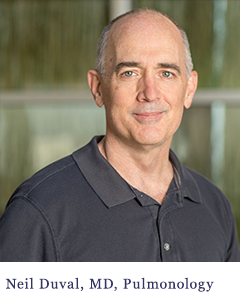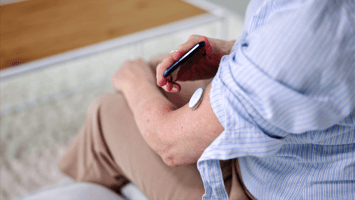How proactive care with Ibis is helping COPD patients breathe better

There’s no feeling in the world as bad as not being able to breathe. People who don’t struggle with lung disease don’t understand that. Being able to breathe, it’s a birthright, it’s the actual basis of being alive, and having that taken away from you is horrible, absolutely horrible. We can help people to breathe better.
Today, we are talking with Dr. Neil Duval, a retired pulmonologist and former medical director for the pulmonary rehab programs at Central Maine Health Care. We’re talking with him about chronic obstructive pulmonary disorder, commonly known as COPD, the sixth leading cause of death in the United States in 2020. More than 16 million Americans suffer from COPD and millions more go undiagnosed each year, according to the U.S. Center for Disease Control & Prevention.
Here at Ibis Health, many of our members have been diagnosed with COPD. And we are here today to learn more from Dr. Duval about how the program can benefit these members and help them to better manage their condition so that they can live well from the comfort of home.
Dr. Duval, I know you come to us with deep expertise in this area, and we so appreciate having you here with us today to talk about this subject. So if we can, we’ll just jump in here. Tell me about COPD, what it’s like for a member or a patient to have COPD and how they can best live with that condition.
What are some of the things that are needed for them to really thrive with that condition and do their best in between visits to their doctor?
Neil Duval: Sure. COPD is complicated on many different levels, not the least of which is that it’s sadly been deemed something that people do to themselves, and even patients have a lot of guilt surrounding it. Even though, I mean, how many diseases don’t we do to ourselves, right? But because of that, patients have a tendency not to report symptoms or problems and not to seek medical attention because of the guilt that’s associated with it. The other thing is that it’s human nature not to do things that are uncomfortable. And patients with COPD, by definition, get short of breath earlier than they should were their lungs to be normal. So they tend to stop doing things, and who wouldn’t? If you do something and it makes you uncomfortably short of breath, the normal thing to do would be to stop doing it. And so patients, when that happens, they start to become more sedentary, and then they are more out of breath when they try to do something. We want to remove the stigma from this and shine some light on it and help patients to realize that they don’t have to put up with an invariable destruction of their lives. I don’t want to get on too much of a tangent, but I feel, if you’ll allow me, that this is a point that is very important.
COPD is chronic. That’s what the C stands for, and so as a result it doesn’t go away. Whatever obstructive lung disease you have, you have for life, but that doesn’t mean patients can’t breathe better. That’s really important to realize. Worsening or poor lung function does not translate into poor breathing. You can always improve, so there is a lot that can be done. You can take steps to help yourself feel better and to thrive with this sort of condition, and the best thing patients can do is to realize that and say, ‘I do have some control over this, this isn’t something I have to resign myself to.’ The Ibis Health program was made for this — it’s made for this diagnosis. Because patients can do it at home, and they don’t have to air that laundry out for all to see.
You’ve walked right into my next question, which is what are the things that are necessary for a person to thrive while living with COPD? And how can a program like Ibis help support and provide those things?
Neil Duval: Now it is important to remember that it is chronic, as we said, and that doesn’t mean you can’t breathe better, but it is chronic and it doesn’t get better from an objective measurement standpoint. What that means is that it’s really important that you keep it from getting worse.
Let me try this analogy: You’ve got twin brothers, with the exact same lungs, exact same lung function. One of them tries to become a marathon runner, and the other one plays video games. They have the exact same lung function, but one of them is going to breathe better than the other.
And it’s the same thing with a COPD patient. They can lose a lot of lung function, but they can do really well with the lung function they have. That’s not to minimize the fact that we can’t let the lung function worsen, because whatever that lung function is, that’s your maximum, that’s the most you’re going to get. So this is where Ibis Health shines, because we know what makes lung function worse in a COPD patient. We all know about smoking and avoiding environments where the air is unfriendly, and getting appropriate vaccines and staying on top of your medicines the way you’re supposed to. Everyone knows that. But the one thing that’s frequently missed is that every time a COPD patient gets sick with bronchitis or what would be called a COPD exacerbation, there is a fair chance that they are going to lose further lung function.
And that’s how we treat it. That’s how we’ve been treating it forever — we wait for people to get sick. And once they are sick, we treat them. But we know that if they get sick, the horse is out of the barn, they’ve already reached that point where they could very well be looking at further permanent loss of lung function. And then what happens? They have less lung function, so they get more exacerbations, and they lose more lung function. So we can tell people ‘don’t smoke’ and ‘take your vaccines’ but the one thing that people need to be empowered to do is, how do we keep them from getting sick? How do we intervene so they don’t get sick? Because if they don’t get sick, they don’t lose their lung function. And that’s where Ibis Health does its best work. Patients can take simple, objective measurements at home, and the Ibis Platform’s artificial intelligence can interpret that data specifically for that patient and say, ‘Hey, you know what? I know you feel fine, but we’re telling you you’re about to get sick. So here’s what we want you to do.’ And the patient does that, and they don’t get sick and they don’t lose lung function and they live a much better life. It’s really exciting!
Wow. And how is that different, Dr. Duval, from how that might be handled by a doctor’s office? What are some of the limitations of our traditional health care system when it comes to preventing these exacerbations?
Neil Duval: So this is quite unique to the Ibis Health program. And this is not to point fingers at anyone because I’ve practiced this way myself for 40 years. In our traditional health care system, we treat COPD by waiting for somebody to get sick, and there is no preventive strategy that’s commonplace right now beyond encouraging smoking cessation, vaccines and avoiding environments that are either likely to cause infection or might be filled with substances that you shouldn’t be breathing. Aside from that, it’s not standard practice to objectively measure for signs of impending exacerbation, is it? The Ibis Health program is quite unique in that regard.
What are some of the specific ways that the Ibis Health program works to predict and prevent these sorts of exacerbations and to interact in a proactive way with patients versus the reactive mode we might find in a traditional health care setting?
Neil Duval: So right now, the Ibis Health program is set up so that there are three things that we monitor: oxygen saturation; a measurement of airflow, called spirometry; and lastly, a subjective measurement, which is ‘How do you feel? How are you doing?’ Because despite all the science, we are still dealing with human beings, and if the science all says that everything is fine, but the patient feels bad, well, then the patient feels bad and we should be doing something about that.
With those three things that we measure, the oxygen saturation is one of the last things that’s going to show a problem in an exacerbation. But when it does start to show a problem, it’s a big, big deal. So we also use a second measure of airflow with spirometry, which requires blowing into a machine. And then we ask, ‘How do you feel?’ From a patient standpoint, they know that they measure their pulse ox with that instrument you put on your finger, they blow into a machine — that’s the spirometry — and they tell us how they are doing. It couldn’t be simpler. But what’s running in the background is a lot of numbers and statistics about what’s significant, what isn’t, how many measurements need to be made, etc. And the Ibis Platform takes that data and puts it in the context of all the other knowledge about that patient and adds in the expertise that a pulmonologist would bring to the table.
So walk me through what it might look like for a member with COPD who is on the Ibis Health program versus a patient who is not on the program?
Neil Duval: Well, let’s say two identical COPD patients went to the same wedding one weekend and both were exposed to the same bug. One is on Ibis and the other isn’t. They come home, and Monday, they’re both feeling fine. The Ibis patient, however, notices or the Ibis Platform notices that the patient has shown a little bit of variability today in their objective measurements — the pulse oximetry and the spirometry. Not enough to be worried about, and the Ibis Platform might not even tell the patient to do anything, but the platform will say to itself, ‘I need to watch more carefully.’ Tuesday comes around, and again, they’re both still feeling great but the Ibis Platform has told the Ibis patient, ‘I want you to do a couple extra measurements today, just in case.’ And sure enough, those couple extra measurements show some concern that statistically, this patient might be heading for an exacerbation. So the platform at this point say I want you to do XYZ, take some more of your inhaler or whatever the determination is at that point. The other patient still feels fine — he doesn’t do anything.
Wednesday rolls around, and the patient with Ibis is starting to feel a little bit sick, but not terrible. The Ibis Platform is still picking that up and says, you know, you’re definitely getting ill here and it makes recommendations for him to increase his self-management. Meanwhile, the other patient is now full-blown ill, coughing, feeling awful.
The following day, that patient is now on his way to the emergency room, but the Ibis patient is starting to feel better because the Ibis Platform has given these self-care steps, like maybe take some extra doses of your inhaler, to try to catch things before they develop into something further.
So the key thing there is that first step, where the Ibis Platform recognizes the potential problem and kicks itself in gear, makes recommendations to the patient to take additional measurements that confirms the problem and then takes steps to help the patient to treat themselves. So just as they would have otherwise been getting sick, they get better instead. Classically, for my whole career, I would have been treating the first guy. That’s the standard of care. We wait for somebody to call us up and say I feel awful and then you do something.
I would imagine that at that point, when you are waiting until the patient says I don’t feel well, it’s also maybe harder to pull it all back and get the patient feeling better again versus taking these little steps along the way?
Neil Duval: Exactly. Any medicine frequently used for exacerbations, for instance something like an oral steroid pill, those don’t work right away, or if it’s antibiotics, those don’t work immediately either. In Ibis Health, some of our self-treatment algorithms have oral steroids built into them, so our patient could take a dose before they even start to feel sick. And by the time they were about to get sick, it’s already working. … By recognizing an impending exacerbation and intervening before it becomes a full-blown problem, many of these patients will never reach the point where their symptoms are bad enough that they would have even sought care, let alone go to the hospital.
There’s no feeling in the world as bad as not being able to breathe. People who don’t struggle with lung disease don’t understand that. Being able to breathe, it’s a birthright, it’s the actual basis of being alive, and having that taken away from you is horrible, absolutely horrible. We can help people to breathe better.




